The devil must have made you!
Som ni kanske minns från tidigare inlägg så var det planerat att en av de första två intervjuerna till Cool Profile skulle bli med Earth & Stone. Av diverse anledningar har det nu inte blivit så och istället presenteras intervjun på reggae-vibes.com. Det är fantastisk läsning av den alltid lika duktiga (och svenska) Peter I.
Läs intervjun här;
http://reggae-vibes.com/concert/earthstone/earthstone.htm
Enjoy!
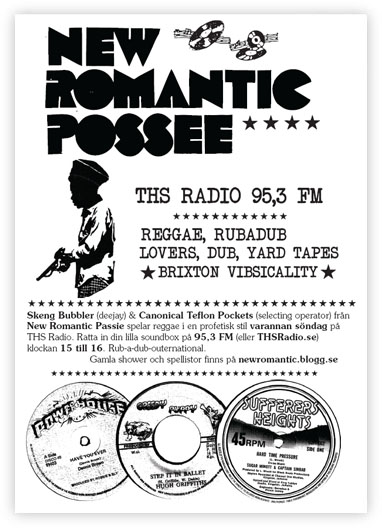
Gjorde även en lite retrodoftande poster igår för radioshowen. Ska nu trycka upp ett par hundra exemplar och lägga upp dom i Stockholm stad. Jag tycker den blev riktigt fin (...om jag får kringgå jantelagen lite idag).
Skolan har även trappat ner lite i tempo för tillfället så jag kan börja koncentrera mig lite mer på bloggen snart igen. Ledsen att det varit så sporadiskt med uppdateringar senaste månaden.
Läs intervjun här;
http://reggae-vibes.com/concert/earthstone/earthstone.htm
Enjoy!

Gjorde även en lite retrodoftande poster igår för radioshowen. Ska nu trycka upp ett par hundra exemplar och lägga upp dom i Stockholm stad. Jag tycker den blev riktigt fin (...om jag får kringgå jantelagen lite idag).
Skolan har även trappat ner lite i tempo för tillfället så jag kan börja koncentrera mig lite mer på bloggen snart igen. Ledsen att det varit så sporadiskt med uppdateringar senaste månaden.
Spellista för showen 25/10-09

Easy now operator, Canon! How yuh come tuff soh? Jah vet att söndagens show var dandomite dread. För dreadlock eller baldhead. Tillbaka i studion och inspirerade av rootsclashen från dagen innan bestämde vi oss i söndags att hålla fokus på nyahmannens hjärtslag. Djupa rötter och kompromisslös kultur. Zuluvinyler spelade med lejonklor till pickups. Urvalet främst ur 70- och 80-talets JA-roots men även ansatser att hålla oss aningen varierade på både årtionden och inspelningsländer.
1. Dennis Brown - Slave Driver (Emmanuel Music 7")
2. Massive Dread - Mutual Inspiration (His Majesty LP)
3. Natural Ites - Lion Inna Jungle (CSA 12")
4. Freddie McGregor - Jahovah (Observer 10")
5. Prince Allah - Devil Woman (Archives EP)
6. Gregory Isaacs - If You See My Mary (African Museum 12")
7. Reggae George - Armagiddeon Man (Humble Commission LP)
8. Deadly Headly - Humble Glory (Humble Commission 7")
9. Ronnie Davis - False Leaders (Trojan LP)
10. Disciples - Prayers (Disciples Vintage 10")
11. Alan Kingpin - Stand Up For A Right (Archives 10")
12. Bob Skeng - The Lion (Roots Garden EP)
13. Don Carlos - Cool Johnny Cool (RAS LP)
14. Freddie McKay - Take My Hands Oh Jah (Yah Congo/Digikiller 12")
Nästa gång gästas vi av Ludde och Elias från Bangarang HiFi. Kolla deras blogg i länklistan till höger. Den är fräsig och piffig på en och samma gång!
Ladda ner spelningen här;
http://www.megaupload.com/?d=HDN1K3W5
Spellista för showen 11/10-09

Worries an' bodderation!
Vi hade idag besök av vår gode vän Jakob från Tesfa och som alltid är det kunskap, intelligens och vibsicality som han för med sig. Fokusen för showen var kvinnliga reggaeartister - otaliga artister med nuff stil men som på grund av sitt kön fått slåss extra hårt för att komma fram. Tyvärr så strulade vinylspelare och CD-spelare så Jakob fick tyvärr sköta allt arbete på endast en vinylspelare och INGEN CD-selection. Därför blev det en oerhört mindre katalog att spela från än väntat men desto mer diskussion erbjöds. Tyvärr har de första minuterna av inspelningen fallit bort och därmed även presentation av Jakob. Vi ber om ursäkt för detta.
Missa förresten inte TESFA och MEDITATIVE SOUNDS nu 24/10 när de spelar på Fanny's. Mer info finns på Tesfas MySpace.
01. Jennifer - What It Is (Twinkle 12")
02. Nana Genesis - King Come Conquer (Surr Zema Music LP)
03. Sister Rashida - Shashamarne I (Surr Zema Music LP)
04. Jennifer - Do Jah Works (Twinkle 12")
05. Lorna Asher - World of Atrocities (River Bank Records 7")
06. Sister Audrey & The Shanti-Ites - Forward Home (Falasha Records)
07. Sister Miriam & The Shanti-Ites - Digital Children (Falasha Records)
Ladda ner spelningen här (introduktion verkar inte ha kommit med);
http://www.megaupload.com/?d=FSF3TR2K
I'm no Robot!
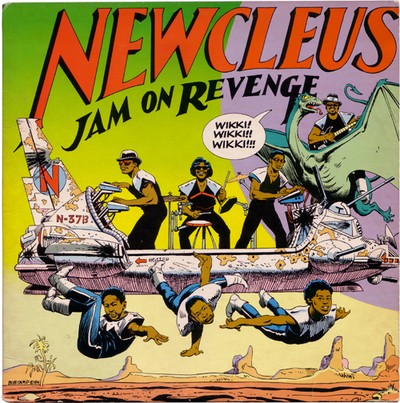
Har tagit det ganska lugnt med bloggen ett par dagar och det beror främst på två saker. Skolan är pure pressure + reggae är faktiskt inte särskilt kul för tillfället. Så i hopp om att finna tillbaka till den okompromisslösa euforin tar jag upp min vandringstav och gör ett vemodigt besök tillbaka till mina rötter. Jag började ju älska musik som ett barn av det unga 90-talets hiphopkultur och ett grekiskt frö grott i den småländska jorden. Ologiskt måhända att jag försöker komma tillbaks genom att vandra bort men jag orkar inte längre stega i mina Gideon-stövlar och khakiskjorta. Reggae är verkligen inte vad jag vill hänge mig åt just nu.
Idag har mina rötter representerats av Newcleus (skriker inte omslaget Tony McDermott förresten?!) och rembetikosångaren Grigóris Asíkis. Synthfläskig elektrohiphop varvat med tuberkulosmörker ur oudens elva strängar.
Imorgon kväll kommer jag dock besöka Fast Forwards invigning av sitt egna ljudsystem! Det hoppas jag att hela Stockholms-massiven försöker närvara på. Förväntar mig storslagna digitala dängor och hoppas på en eller annan rub-a-dub-historia. Oavsett är jag övertygad om att det kommer vara bra.
På söndag sänder vi radio igen! Det verkar som att det blir en rootsman specie och då lovar jag att vi kommer skjuta iväg ett par otroligt hårda alster. Obskyrt, klassiskt, legendariskt ... oavsett så kommer det vara fantastiskt. Det vågar jag nog lova. Söndag är en bra dag som jag ser fram emot. Selassie I know!
Vem gav dig ditt efternamn? + lite Oslo steppin'

Vad har Theophilus Beckford, Ewart Beckford (U-Roy) och Neville Beckford (Jah Woosh) gemensamt? Uppenbarligen efternamnet. Kanske ett simpelt och tråkigt svar men det har en än mer intressant historia har jag fått reda på. Kollade på första delen av en dokumentärserie vid namn The Slavery Business som sändes tidigare idag på TV8. Just den första delen, med undernamnet Sugar Dynasty, fokuserade på familjen Beckford som blev vidrigt rika genom slavarbete och sockerproduktion i Jamaica. Deras slavar fick i sedvanlig ordning ärva slavägarnas familjenamn. Så en Jamaican med efternamnet Beckford, ett väldigt vanligt efternamn i JA, kan därmed med stor sannolikhet följa sina rötter tillbaka till slavar som arbetade för sockermagnaten.
Jag vet inte om första delen kommer gå i repris eller om den finns tillgänglig på DVD - torrentsidor bör dock kunna undsätta den sugne. Kan dock rekommendera dokumentären helhjärtat då den ger en väldigt levande och givande insyn i den avskyvärda engelska slavhandeln.
Får mig onekligen att tänka på Jux episka »Sons Of Slaves«.
Som jag skrev någon gång i juni på bloggen så gick jag och Jens på en dans där Channel One + Medidative spelade när vi var i Oslo. En väldigt bra dans som visade bredden av roots och inte fokuserade bara på det nyaste och mest militanta. Idag ser jag att det finns filmklipp från kvällen i fråga och om man är lite uppmärksam så kan man skåda Jocke Skeng och Teflon Pocket Jens när de steppar i stor stil (i grund och botten de enda två som man kan urskilja från mängden).
Grattis Sverige!
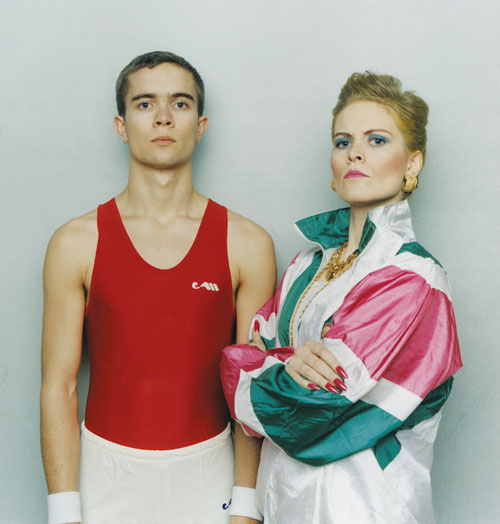
Läser Pitchforks eminenta (men reggaefria) sammanfattning av de 200 bästa albumen släppta under 00-talet. Vissa självklara val finns med, andra roliga överraskningar och även en mängd album jag aldrig hört talas om (hur fan kan jag ha blivit så gammal och out of tune redan nu?). Det som gjorde mig allra gladast var dock att Sverige verkar ha fått ett enormt genombrott internationellt. Massvis svenska alster får plats i listan och omnämns med vördnad i deras summeringar av årtiondet. Bland annat Robyns fantastiska självbetitlade album på plats #68 (och kanske det närmaste vi kommer reggae med avseende på hennes cover av Cobras Press the Trigger så är ju kopplingen långsökt i allra bästa fall) och the Knifes magnifika Silent Shout på #15. Man blir riktigt dumpatriotiskt stolt. Jag saknar dock underbart underbara Jenny Wilson på listan.
The Top 200 Albums of the 2000s: 200-151
---> 200 - 151
---> 150 - 101
---> 100 - 51
---> 50 - 21
---> 20 - 1
... och ja. Jag ska försöka hålla mig till reggae mer hädan efter.
http://pitchfork.com/features/staff-lists/7710-the-top-200-albums-of-the-2000s-20-1/
Franco Rossos Babylon
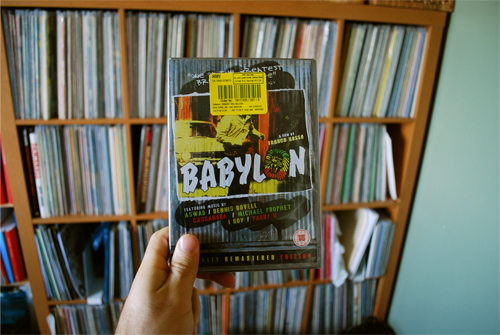
Den fantastiska filmen Babylon blev ju äntligen utgiven på DVD med restaurerad bild och ljud. Vilket är helt klockrent då det är den definierande filmen när det kommer till att visa hur reggaen såg ut i England under slutet av 70-talet. I vilket fall har jag som vanligt snålat oerhört länge med att köpa den för att jag hoppades att kunna få en bra deal på filmen (jag hade ju redan sett den så det var ju ingen stress). Och den tålmodige belönas; HMV i England kör nu en kampanj där flertalet filmer reas ut för otroliga priser. Bland annat Babylon för £5 (passa även på att beställa lite klassisk japansk film från regissörer som Kurosawa och Kobayashi!).
Inklusive frakt till Sverige blev filmen strax över 100 kr. Verkligen prisvärt. Jag kan även rekommendera att plocka upp soundtracket också som numera inkluderar de tidigare outgivna dubcutsen producerade av Dennis »Blackbeard« Bovell. Själv gjorde jag misstaget att snåla och låta bli den ... £7 är den dock värd.
Filmen finns här - http://www.hmv.com
Medan ni väntar på er DVD kan ni kolla den här perfekta lilla summeringen av slutuppgörelsen mellan Shaka dubkrigaren och de unga lejonen med sin Aswad-dubplate (från en gammal VHS).
Måste även passa på att rekommendera den här sidan (av John Eden) för lite extra läsning om filmen;
http://www.uncarved.org/babylon/
Straight outta fiction!
... a crazy mothaphukkka called notis(-kub)!
Läste en kul liten notis i Stockholm City idag om en norsk konstnär som har en utställning. Notera den understrukna meningen.
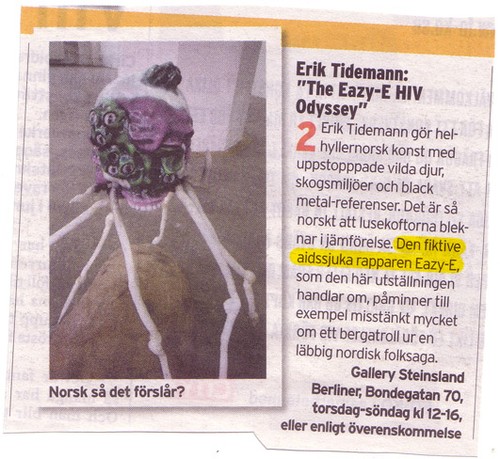
Hiphop var min första musikkärlek (och än idag kan jag sporadiskt nostalgitrippa över album som NWA's Efil4zaggin). Men efter cirka tio års intensivt lyssnade så hade jag ingen riktig relation till musiken längre. Den dog abrupt. Likväl vill jag känna att det var genuin kärlek och ingen ihålig förälskelse.
Men ovanstående understrukna mening får en att tveka aningen på hur riktigt det kan ha varit ... Eazy-E var nämligen högst reell i min värld. Lika reell som HIV-smittan var i hans värld. Uppenbarligen kanske man tillbad a false idol eller har journalisten bara världens sämsta popkulturella koll? Eazy-E måste väl vid det här laget vara lika känd i svenska hushåll som Jokkmokks-Jocke?
(... och för er som missat så har jag slängt in halv-som-halvt långsökta referenser och ordlekar speciellt tillägnade mina hiphopvänner från way back ... check yo' self!)
Läste en kul liten notis i Stockholm City idag om en norsk konstnär som har en utställning. Notera den understrukna meningen.

Hiphop var min första musikkärlek (och än idag kan jag sporadiskt nostalgitrippa över album som NWA's Efil4zaggin). Men efter cirka tio års intensivt lyssnade så hade jag ingen riktig relation till musiken längre. Den dog abrupt. Likväl vill jag känna att det var genuin kärlek och ingen ihålig förälskelse.
Men ovanstående understrukna mening får en att tveka aningen på hur riktigt det kan ha varit ... Eazy-E var nämligen högst reell i min värld. Lika reell som HIV-smittan var i hans värld. Uppenbarligen kanske man tillbad a false idol eller har journalisten bara världens sämsta popkulturella koll? Eazy-E måste väl vid det här laget vara lika känd i svenska hushåll som Jokkmokks-Jocke?
(... och för er som missat så har jag slängt in halv-som-halvt långsökta referenser och ordlekar speciellt tillägnade mina hiphopvänner från way back ... check yo' self!)
Intervju med Norman Grant - 26/07/2006
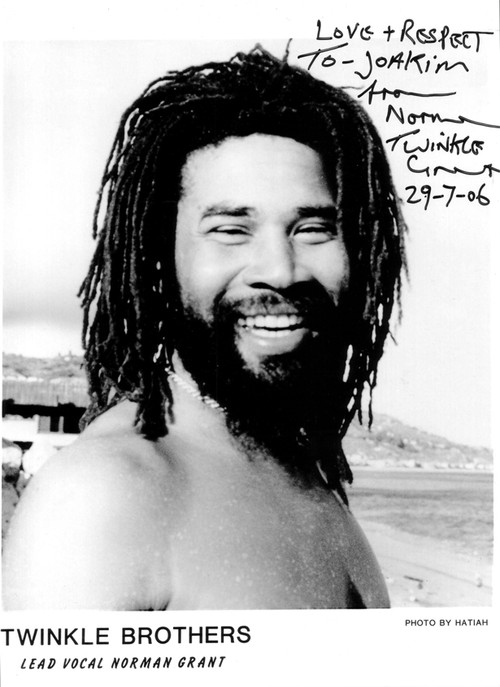
Sensommaren 2006 arrangerade Shagga (från numera nedlagda Ablaze Records) Urban Culture Festival. På papprena en otroligt lovande festival med flera stora namn på repertoaren (Luciano, Dennis Alcapone, Buro, Earl 16, Twinkle Brothers, Chukky Starr bl. a). Det verkade som att även om det inte handlade om en ny reggaefestivalernas regent i Sverige så i alla fall en konkurrent med pondus. Av flertalet anledningar gick det inte riktigt som det skulle och festivalen kom att bli en kalkonartad fars jag fortfarande minns med en ångestklump i magen - till stor det för smällen arrangörerna fick ta.
Tack vare Gabriel (moderator på SkaWars, stilig selector och tillika en väldigt god vän) så fick jag smyga in gratis på festivalområdet vid Dieselverkstaden (stort tack än en gång, Gabbe!). I gengäld skulle jag styra upp en intervju med Twinklarna - min kanske absoluta favoritgrupp när det kommer till rotreggae - för att publicera på forumet. Jag var oerhört nervös att få tala med frontmannen, Norman Grant, men lyckades i alla fall övertala honom att tala med mig om än i allra största hast - Norman var inte så sugen på att socialisera med folk av förståeliga skäl. Deras show hade blivit avbruten två gånger, av att strömmen inte pallade slummens puls, inom vad som inte kunde ha varit mer än en kvart till tjugo minuter. Vid andra avbrottet lät lejonets röst sina lockar svinga när han irriterat men hövligt tackade för sig själv med en bockning och gick av scenen. Bakom scenen kunde man se honom lick a spliff och tala med gruppmedlemmar i besvikelse över hur misskött det hade varit. Det var ju nämligen just det tillfället jag stegade fram.
Då intervjun inte materialiserades på SW så var tanken att min vän, Björn från exemplariska tidningen Reggae Galore, skulle få publicera den på nätversionen av tidningen. Detta måste ha varit kring två år sedan. Enda kravet var att Björn skulle översätta texten till svenska och så kunde jag putsa upp och göra en färdig artikel av det. Ni kommer få läsa intervjun på engelska nedan - det stannade nämligen där.
Sen tänkte jag att jag skulle använda mig av intervjun i mitt kommande mini-projekt, Cool Profile. Reggaefanzinet med fokus på intervjuer av gamla legender och obskyra idoler. Fast jag kände en stark motvilja att använda så gammalt och inaktuellt material. Därmed har jag bestämt mig att istället för att låta den gamla rackaren förpassas in hårddiskens skuggdova och dimhöljda korridorer att publicera intervjun här. I oputsad form.
Oputsad även om jag idag ser jag otaliga brister och fel i hur jag la upp intervjun (och om lyssnar man på inspelningen så rodnar jag så mycket att man kan tro att jag inombords viskar slackheter till mig själv). Samtidigt kan jag tycka att jag fick ut en del värdefull information och tar man det för vad det är så bör jag faktiskt vara ganska nöjd och aningen stolt. Jag får se det som ett första stapplande steg inom intervjuteknik för det kommande Cool Profile (hur blida kommer mina ögon egentligen vara på Cool Profile om ett par år?).
I vilket fall ... får jag be om största möjliga tysssssstad...
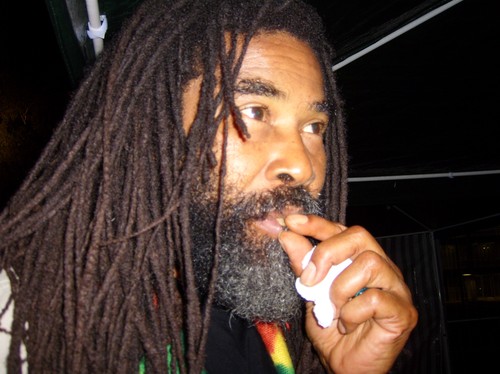
NORMAN GRANT
Let's start from the beginning then. Where did you grow up?
In Falmouth Trelawny, born and grew up.
And where did you start singing? The first experiences.
Well I could remember at the church concert. Yunno, when I was like eight years old they used have some little concert I would take part in. And my brother and myself would take part and you'd built up you own little stories and make your own little songs. So I've been like making my own little songs from long time.
Did you sing anything in churches and such?
Well as I would say there was like the local [church], cause they had different type of church, yunno, lots of churches in my town. Yunno, from Roman Catholic, Presbyterian, Anglican. You have the church of God. Yunno. Those. Poccomanian. All those kind of church, so we used to go around. Cause the poco church them make clap [claps hands], music yunno. So we used to love that a little more. Then there was those kind of local church where you actually would get the chance to perform. But I actually start to work, or actually get paid to sing from I was twelwe ... ten. Yeah, from I was ten.
This was in '62?
Yeah, I'm singing with little local bands in the hotels. The Cardinals, Shubert and the Mercers? Lanstel Will and the Selestians.
What kind of reggae where you playing then?
My first song was »Somebody Please Help Me«.
Was that one for Leslie Kong?
Yeah, we where listening whatever popular song at the time. So I remember one of my first songs, 1962, was like »tell me my darling if you love me«.
Beatiful!
[both laugh]
This was the same year you got your name?
Yeah that was the year we attended the festival and that was our song.
I understand the brothers part but wherefrom did you get the Twinkle?
One of the early rastaman, named So-Mi-Say. We were rehearsing and he said I wanna give you a name. And he just came up with Twinkle. It was like about seven o' clock in the evening so maybe he was watching the stars and came up with the Twinkle yunno? Really, Twinkle I think it's a good name.
In these six or seven years you were participating in a lot of competions in your parish?
Yeah, we won at our parish level from '62 right up on to '68 we won two gold medals. In the all island. I won as a solo artist and also as a group, as Twinkle Brothers. So there was two gold medals in yunno the whole Island. In '69 we won again and in 1970 we took part in the festival song contest. It was like Toots & Maytals »What a Bam Bam«. Desmond Dekkar and the Aces. We came third that years. »Boom Shacka Lacka« won. Hopeton Lewis. But yunno, as I say. Within the whole things was also like election. With the festival song It was politics. Where you from? From when we did the shows everybody love us. But when we came to the voting it was political. But it was still good for us because we made our name now. Proving that we where in a different style and category of our own.
In '70 you started recording for Bunny Lee.
The festival song was the first song we did for him. »You can do it too«. Shu-Be-Do. Then we did »Not Who You Know«, »Miss Labba Labba«, »Sweet Young Thing Like You«, »Best Is Yet To Come«, »Miss World«. We did about fourteen tracks for Bunny Lee. I'm sure if he could find them now he would release them. The producers from them times 'til now would have them favorite act at that time and whatever they would protect. But still he did love us. What Bunny would do when you were singing for him. He'd promote you by going round to different neighbourhoods. And the other singers, he would taunt them. Like if it was the Heptones or whoever he would be like [mimics Bunny Lee] »Yuh cyaan sing like the Twinkle Brothers«. Yunno, that kind of way. So when we meet these guys they be like now I am a big guy. And I meet guys that say »Bway, Bunny used tell me 'bout yuh«. But because we're in the country there's a whole lot of disadvantage. When living in town you're near to the studios, so you could go there on the days when they actually recorded and you get to record at that day.
But living in the Country I can imagine affected your sound
Well, in the hotels we're doing all type of songs. So we where playing in the bands. Any popular song of the day, we were doing them. I think that also helped me now with my songwriting. Because with melodies, I can know when melodies are clashing. You have some singers nowadays that are singing other peoples melodies and think it's their own, because the mind isn't wide enough or have heard enough songs. You can catch melodies and think it's you melody but it's...
...stolen from somewhere else.
Exactly! And then you have these ideas and you can change. Because music is only so much parts. It's the way you use them. If you think, the same part you can put the melody a thousand millions different ways.
Bunny Lee helped you in contact with Lee »Scratch« Perry.
When you're with Bunny. If he's doing a session on that day and another producer is recording on that day he would just say »gwaan and make a tune for that guy«.
And what did you record?
We do a song named »Reggae For Days«. I can't remember all of the other ones. Only one of them did get released, »Reggae For Days«.
On the Upsetter Label?
I don't know what it came out on. I got som PRS, performing rights, royalty. Because those days when reggae was coming in. Every singer was singing about reggae. »Do the Reggay«, so it was Reggae Reggae For Days«.
We did some songs for Phil Pratt.
This was in '73 and '74?
Yeah. I don't remember the names. »Friends«, »No Big Thing« and »Do You Own Thing«.
Excellent tracks all of them. In '75 you went to a tour in Guatemala, Mexico.
Yeah, with the Sonny Bradshaw Band. Dean Fraser was playing with Sonny Bradshaw at the time. I did a tour with them. I was singing at the hotels at the time and I needed a good upfront chance.
Was this prior to the release of Rasta Pon Top?
It was after, because it was the first tour I had been on abroad and actually leave Jamaica. Goind abroad. But the songs I was singing was from different type of bands. Like Tom Jones. Covers, yunno them style of songs.
Was this approximately the same time you opened up your store in Falmouth?
Yeah, in the 70's. 'Cause I worked at the little hotels and had a little fun. I was producing and I had started producing my own self, so I needed an outlet. Cause in the business you have to. I was putting on shows before that. Promotion. From I was 16. Bring guys from Kingston, like Ken Boothe, to the country to do shows. And I get the idea now to produce myself. Because the shows some times they popped, and you don't make no money! You don't make no money and the place is full. I learned that part from the business at that time. So I decided now to spend the money on myself. I'm gonna invest on myself wich I think is a good thing to do. And having the shop where I can play the records. People hear the record. Because the thing with music is if it get played people will hear. And how I try to make music is that when people hear it they don't have to know who's singing to like it or say »I wanna buy!« it just because I know that is Twinkle do it«. I prefer they buying it because it is a good song.
You were producing yourself to get money ...
No, no ... I'm not big man. I'm 56 now. I started to check the business and said well it is good to have control.
Was it always in your scope to be a fully self contained group. Bot labelwise and production.
Yes, because ... well I see how the business was from that time I realise that it's good to have control. Music it is a controlled thing.
When I started producing myself I realised it was the best way to go. No to cover. I started doing covers from early times, yunno. But I realised that to do originals is what is going to make you as an group or an artist. To make your own mark.
In '77 you recorded five songs that was to become the album Love. How come it was released as a full length 10"?
It was only what I had. I came to London on a holiday and I had these tracks and somebody told me that Virgin was signing up. They were looking for artists. So I went there with four or five tracks. And I played them and they say »do you have anything more?« And I had »I Love you So« which I didn't play at first. And they said »Yeah, We Love that one!«
Why didn't you play it?
Well, yunno. Because the quality of it at the time. I remember when we were doing it and I say when it reach on of the albums I'll remix it. Cause when I hear it you couldn't play it on certain turntable of the time. You maybe had to crank it up. The mixing wasn't right.
But you released the album as a 12" eventually.
Yes I put two more tracks on. Because by that time I had more songs.
When was this? Was it basically the same year?
It was .. 86 .. 87 ... 88? 88, I think it might have been 88. And 89 they came out with Countrymen [Norman must have mixed it up and added ten years to the dates, sine Praise Jah was release in 79]. Some tracks on countrymen. Like four tracks. Not Countrymen. [thinks for a second] Praise Jah. Those where mixed in Treasure Isle. Treasure Isle studio that track was done.
In the 80's you where transfered from Frontline to Virgin.
Well, Virgin, they where doing all these kind of things. Cause I guess maybe they see you with potential. Twinkle, Gladiators and I think U-Roy where the three last reggae artists on their label. So they move us from Frontline to the Virgin. Cause the Virgin label was a more established label anyway.
I've always seen it as an odd choice to release Jah Kingdom Come and Never Get Burned on a blank disco when you had a deal with Virgin.
Well them time now, people, the local producers the likkle streetman where doing these things and selling a few thousands or whatever. So them just do it, yunno, and it was like a limited edition. It was for sound systems. A lot of the sound system at the times where playing those songs.
In 1980 Jacob Miller passed away. And you joined IC, was this the same time?
Yeah, after my first American Tour. Just after that Jacob died cause they had a new album that they where working on. So I went to do all the work on their tour.
Did you record anything with them?
No, I didn't record anything because at the time I was getting ready to go to England with the Twinkle Brothers.
Twinkle Brothers where always your main priority?
Yeah, I just went because I was still singing in the hotels. Even though I had my Twinkle Brothers I was working as a solo act in the hotels. So I just went down cause them knew of me cause some of them guys that worked with them played in the festival in 1970. They where the backing band. They where singing the festivals all over Jamaica. Third World was Inner Circle at the time. Ibo (Michael Cooper) and Cat (Steve Coore) [from Third World] there where in the Inner Circle band at the time and then they leave and form Third World. So I went and we did the tour. It went very good, I met people now and I said I have a group now that's called Twinkle Brothers. And just after I left that tour in America I think it about a month after I went to London with Twinkle Brothers. '71. Cause them guys where waiting on a deal. At the time they have pressings plants, they have studios, they [Inner Circle] have everything, yunno? But like I said, I wasn't sitting down waiting. I did it because they asked me to and yunno I did. It was a good experience too but their music was actually like rock, really. While reggae rock hardcore! Yunno?
You had these excellent deejays, Sir Lee & Illie P. What happened with them?
Well, Sir Lee still inna music. Him have him sound (Screaming Target Sound). Him still play in the country. Because he builds amps. I haven't seen him for a good while though. I took them guys to studio, nobody else did. I still have tracks of them that haven't been released!
I heard you had a full album with Sir Lee.
Yes, I have another album from him.
Can you tell me a little about Alla that recorded the song Babylon A Fight Rastaman for you?
Austin Williams is his name. He went to America, but he is back in Jamaica now. But he's kind half-key right now the bredda. That is the one song he did, yunno.
You also worked with Phillip Parkinson. You even have an album with him called »Redemption Time«.
Yeah, still to be released. Still I have over 60 albums to be released.
Tell me a little about the singer Stiffy Dread.
Stiffy dread was a farmer. Well he is a farmer still. He was the man who used give the good herbs to smoke. He come up with little ideas at the time, he come up with that idea yunno. [sings] »If I serve any other god Selassie I would kill I«. Its a bad tune. I suppose to re-release that one yunno. I'm just trying to find the tape. I've make sure I put away a couple of records just incase I can not find the tape so I can lift it from the record.
You have a song called Rastaman Dub on the Old Dub Cuts Pack. This song is the only one of the bunch that wasn't released. Tell me a little about the song.
It was Chant Rastafari, the first cut that we did. But the tape wasn't playing right and the vocal track was a bit wobbly. So I just pull out that voice and just let the riddim run. But I re-recorded that song. It was on the Chant Rastafari album..
In '82 you released Underground. Was this your first work with Jah Shaka?
Well, I meet shaka from late 70's. So when I go to London, I meet them guys and go to the dance. They hang about want to get dubs and things. So actually I know Shaka from late 70's, really.
You where recording dubs for him in the 70's?
He was trying to get dubs from me but I never actually start to until like when the Virgin time. His first song is me who played drum on his first song. »Revelation 18« (sings). »Get out, get out, babylon a burn« It's Twinkle Riddim section. It was made out of a Twinkle session and Shaka played the bass. And Shaka played bass on two other tracks on the Underground-album.
Now that you mention the drums. How long have you been playing drums? From what I've heard you were building your own instruments.
[laughs] Just like any youth I take cans and pan and play dem and get different note and thing and when it sound right yunno. My brother used fishing line with some sardine cans and yunno, those kind of way. It sound good, it work!
1982 you released your first dub album of many. How come you named it Dub Massacre 1?
Well at the time whole heap a ting a gwaan. Like even now. Lots of war and whole heap of massacre. So within the times I just reflect the time. And in those times people where saying like this music is killah, murdah! Refering to the music. Which means is good. Now people say »bad! that one is bad« as in good.
The year after you released the incredible album Burder Bearer. You used the Roots Radics on five tracks.
I've been using studio musicians from long time. Before we start to play ourselves I would use Sly & Robbie. Well, I never used Robbie but Sly. Lloyd Parks, Raunchy, Skin Flesh & Bones, Family Man, Carly, some of the Wailers band. At the time they where playing with the upsetter. Them guys played for everybody at those time.
Dub Massacre 2 was released as two different version. One original that later was pulled and remixed and issued again. How come you released a remix version of it?
Yes, well It needed something more. The music was lacking something.
Still the Twinkle Brothers never really embraced the dancehall sound that the Roots Radics where so famous for.
No, when I go to studio, the real music where making from my time what I still like is you sing and the musicians play to fit what you doing. Now with technology you can create the beat to whatever speed you want it. Some song couldn't play faster than how they play. And some musician have their style of play and you're not going to get them play a different way, cause that is their style. So like RR the way they play, that was their style and because music was one drop at the time they where getting sessions. Every so often there will be some musician that everybody will use within a time. That was given the hits. Whether from Familyman and Carly. Them had a lot of name them times. Hippy Boys, Upsetter. The Wailers. Whole heap of different names.
So where chosing all these people and we start play for ourselfes now. We try musicians from Montego Bay to Kingston. To play some of our stuff, »Like down came the Rain« and those tracks.
When did you move to England permanently?
'86. But I go to Jamaica three times a year. I have to recharge yunno. Recharge the batteries.
In 1988 you released your first album that came from working with polish musicians. Twinkle in Poland.
I started in Poland from '86. A brother from Poland he was working on the polish radio. A good friend. He came to London on holiday and Twinkle Brothers was one of the artists he was interested in. He heard about some artist that where living in England so at the time I was there and we met up. And he said the music is popular in Poland and that I should come.
Was it he that got you in contact with the Trebunia Tutki family?
Yeah, he is the same bredda.
So what how come you did this excellent blend you have on the Higher Heights album?
He know these people from that he is a journalist. And he knows their music and what I do and he figured it's a good blend. So we actually went there and lived with these people for a week at their home and rehearsed with them. They singed their thing and I put the beat to what they're doing. Dub Judah and myself that play the music.
So why do you think it mixed so well?
Well it's just. It never feel new to me. Cause I grew up in jamaica and they used to have these fiddlers in the late 60's. They played those fiddles and dressed up like those european big dresses from Victorian times and playing this fiddle music, yunno. So some of the melodies that I heard from the Trebunia it reminded me. So it was even though I never know what they where saying I had the same journalist guy his brother translate some of the words for me so I can now what they're saying. But then again the people of the country of poland speak different that the one in the city. Some of the thing he couldn't even tell me some the word. The dialect or whatever. But I just used my humour with whatever he said and did it my way. Because I never sing the same time with them. I play the music and let them do their part and I take the tapes to England and I overdubbed my voice over what they where doing.
The album was a success.
It was number one on the world music charts for six weeks or more!
You recorded a sequel?
Not really. We did on the session we did about 18 tracks. I did six tracks from that formed the album. So they overdubbed and out of that work I think they released three albums. I did about eight albums in poland. Cause when I go there I spend the money there to do the recording and to do shopping. I still have an album unreleased.
So are we going to see it released?
Because it is an original it can come any time. Because I don't play music to suit the time. I play music that fit any time. So whenever it comes. But I don't expose the music unless it's released. I'm not one of them producer who want my song to play too much ahead of time. I'm not in to that. Whenever you're gonna play it it must be released so anybody can get it.

(Gussie P och Norman Grant)



